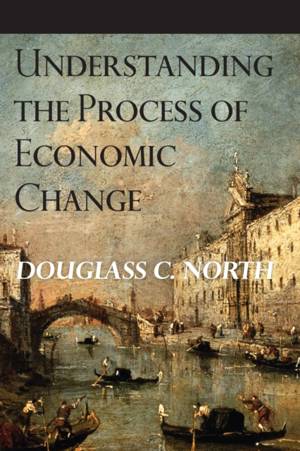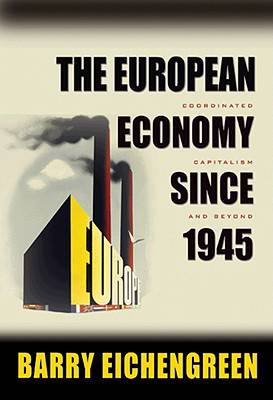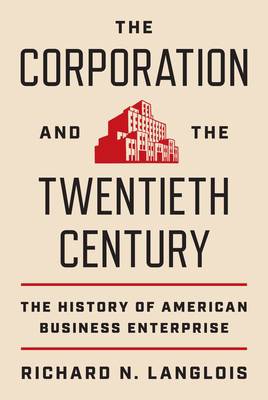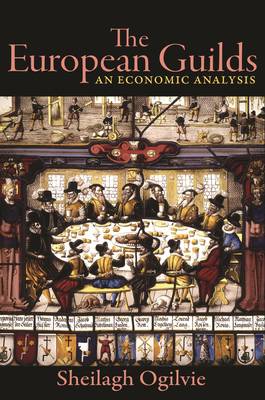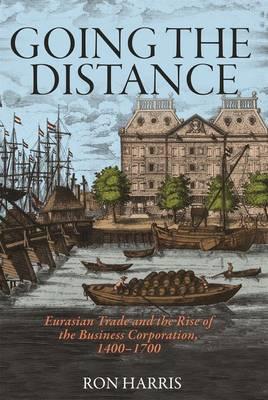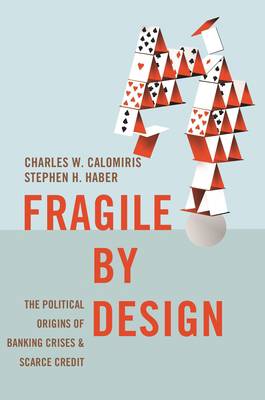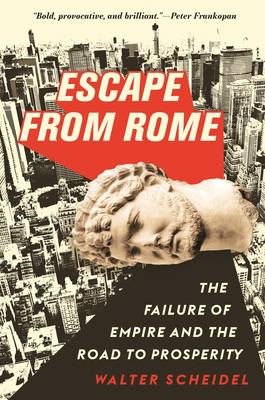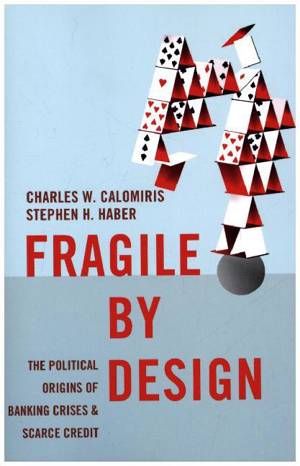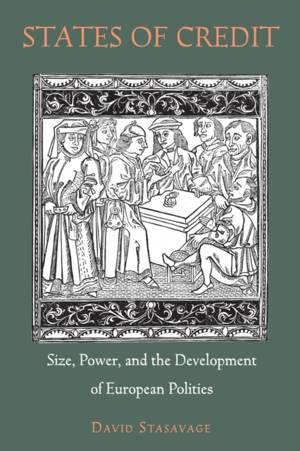
- Retrait gratuit dans votre magasin Club
- 7.000.000 titres dans notre catalogue
- Payer en toute sécurité
- Toujours un magasin près de chez vous
- Retrait gratuit dans votre magasin Club
- 7.000.0000 titres dans notre catalogue
- Payer en toute sécurité
- Toujours un magasin près de chez vous
Résultats pour "Princeton Economic History of the Western World"
-
Brazil in Transition
Lee J Alston, Marcus André Melo, Bernardo Mueller, Carlos Pereira
- Livre relié | Anglais | Princeton Economic History of the Western World | n° 64
- Brazil is the world's sixth-largest economy, and for the first three-quarters of the twentieth century was one of the fastest-growing countries in the... Savoir plus
79,95 €Livraison 2 à 3 semaines79,95 €Livraison 2 à 3 semaines -
War, Wine, and Taxes
John V C Nye
- Livre broché | Anglais | Princeton Economic History of the Western World | n° 20
- In War, Wine, and Taxes , John Nye debunks the myth that Britain was a free-trade nation during and after the industrial revolution, by revealing how ... Savoir plus
56,45 €Livraison 2 à 3 semaines56,45 €Livraison 2 à 3 semaines -
The Mystery of the Kibbutz
Ran Abramitzky
- Livre broché | Anglais | Princeton Economic History of the Western World | n° 73
- How the kibbutz movement thrived despite its inherent economic contradictions and why it eventually declined The kibbutz is a social experiment in col... Savoir plus
45,45 €Livraison 2 à 3 semaines45,45 €Livraison 2 à 3 semaines -
Understanding the Process of Economic Change
Douglass C North
- Livre broché | Anglais | Princeton Economic History of the Western World | n° 32
- In this landmark work, a Nobel Prize-winning economist develops a new way of understanding the process by which economies change. Douglass North inspi... Savoir plus
44,95 €Livraison 2 à 3 semaines44,95 €Livraison 2 à 3 semaines -
The European Economy Since 1945
Barry Eichengreen
- Livre broché | Anglais | Princeton Economic History of the Western World | n° 23
- In 1945, many Europeans still heated with coal, cooled their food with ice, and lacked indoor plumbing. Today, things could hardly be more different. ... Savoir plus
54,45 €Livraison 1 à 2 semaines54,45 €Livraison 1 à 2 semaines -
The Corporation and the Twentieth Century
Richard N Langlois
- Livre relié | Anglais | Princeton Economic History of the Western World | n° 119
- A definitive reframing of the economic, institutional, and intellectual history of the managerial era The twentieth century was the managerial century... Savoir plus
84,95 €Livraison 2 à 3 semaines84,95 €Livraison 2 à 3 semaines -
The European Guilds
Sheilagh Ogilvie
- Livre relié | Anglais | Princeton Economic History of the Western World | n° 78
- A comprehensive analysis of European craft guilds through eight centuries of economic history Guilds ruled many crafts and trades from the Middle Ages... Savoir plus
62,45 €Livraison 1 à 2 semaines62,45 €Livraison 1 à 2 semaines -
Power to the People
Astrid Kander, Paolo Malanima, Paul Warde
- Livre relié | Anglais | Princeton Economic History of the Western World | n° 46
- Power to the People examines the varied but interconnected relationships between energy consumption and economic development in Europe over the last f... Savoir plus
88,45 €Livraison 2 à 3 semaines88,45 €Livraison 2 à 3 semaines -
The Evolution of a Nation
Daniel Berkowitz, Karen B Clay
- Livre relié | Anglais | Princeton Economic History of the Western World | n° 37
- Although political and legal institutions are essential to any nation's economic development, the forces that have shaped these institutions are poorl... Savoir plus
69,95 €Livraison 1 à 2 semaines69,95 €Livraison 1 à 2 semaines -
Growth in a Traditional Society
Philip T Hoffman
- Livre broché | Anglais | Princeton Economic History of the Western World | n° 7
- Philip Hoffman shatters the widespread myth that traditional agricultural societies in early modern Europe were socially and economically stagnant and... Savoir plus
111,45 €Livraison 2 à 3 semaines111,45 €Livraison 2 à 3 semaines -
Lending to the Borrower from Hell
Mauricio Drelichman, Hans-Joachim Voth
- Livre broché | Anglais | Princeton Economic History of the Western World | n° 47
- What the loans and defaults of a sixteenth-century Spanish king can tell us about sovereign debt today Why do lenders time and again loan money to sov... Savoir plus
51,95 €Livraison 2 à 3 semaines51,95 €Livraison 2 à 3 semaines -
Going the Distance
Ron Harris
- Livre relié | Anglais | Princeton Economic History of the Western World | n° 82
- A historical look at the early evolution of global trade and how this led to the creation and dominance of the European business corporation Before th... Savoir plus
84,95 €Livraison 2 à 3 semaines84,95 €Livraison 2 à 3 semaines -
Fragile by Design
Charles W Calomiris, Stephen Haber
- Livre relié | Anglais | Princeton Economic History of the Western World | n° 50
- Why stable banking systems are so rare Why are banking systems unstable in so many countries--but not in others? The United States has had twelve syst... Savoir plus
46,95 €Livraison 1 à 2 semaines46,95 €Livraison 1 à 2 semaines -
Escape from Rome
Walter Scheidel
- Livre broché | Anglais | Princeton Economic History of the Western World | n° 94
- The gripping story of how the end of the Roman Empire was the beginning of the modern world The fall of the Roman Empire has long been considered one ... Savoir plus
29,95 €Livraison 1 à 2 semaines29,95 €Livraison 1 à 2 semaines -
Fragile by Design
Charles W Calomiris, Stephen Haber
- Livre broché | Anglais | Princeton Economic History of the Western World | n° 50
- Why stable banking systems are so rare Why are banking systems unstable in so many countries--but not in others? The United States has had twelve syst... Savoir plus
38,95 €Livraison 2 à 3 semaines38,95 €Livraison 2 à 3 semaines -
Pioneers of Capitalism
Maarten Prak, Jan Luiten Van Zanden
- Livre broché | Anglais | Princeton Economic History of the Western World | n° 120
- How medieval Dutch society laid the foundations for modern capitalism The Netherlands was one of the pioneers of capitalism in the Middle Ages, giving... Savoir plus
34,45 €Livraison 1 à 2 semaines34,45 €Livraison 1 à 2 semaines -
Pawned States
Didac Queralt
- Livre broché | Anglais | Princeton Economic History of the Western World | n° 108
- How foreign lending weakens emerging nations In the nineteenth century, many developing countries turned to the credit houses of Europe for sovereign ... Savoir plus
47,45 €Livraison 2 à 3 semaines47,45 €Livraison 2 à 3 semaines -
Plagues Upon the Earth
Kyle Harper
- Livre broché | Anglais | Princeton Economic History of the Western World
- A sweeping germ's-eye view of history from human origins to global pandemics Plagues Upon the Earth is a monumental history of humans and their germs.... Savoir plus
38,95 €Livraison 2 à 3 semaines38,95 €Livraison 2 à 3 semaines -
States of Credit
David Stasavage
- Livre broché | Anglais | Princeton Economic History of the Western World | n° 35
- States of Credit provides the first comprehensive look at the joint development of representative assemblies and public borrowing in Europe during the... Savoir plus
46,95 €Livraison 2 à 3 semaines46,95 €Livraison 2 à 3 semaines -
Uneven Centuries
Şevket Pamuk
- Livre relié | Anglais | Princeton Economic History of the Western World | n° 75
- The first comprehensive history of the Turkish economy The population and economy of the area within the present-day borders of Turkey has consistentl... Savoir plus
54,45 €Livraison 1 à 2 semaines54,45 €Livraison 1 à 2 semaines -
Dark Matter Credit
Philip T Hoffman, Gilles Postel-Vinay, Jean-Laurent Rosenthal
- Livre relié | Anglais | Princeton Economic History of the Western World | n° 76
- How a vast network of shadow credit financed European growth long before the advent of banking Prevailing wisdom dictates that, without banks, countri... Savoir plus
74,95 €Livraison 2 à 3 semaines74,95 €Livraison 2 à 3 semaines -
The Great Leveler
Walter Scheidel
- Livre broché | Anglais | Princeton Economic History of the Western World | n° 74
- How only violence and catastrophes have consistently reduced inequality throughout world history Are mass violence and catastrophes the only forces th... Savoir plus
24,95 €Livraison 1 à 2 semaines24,95 €Livraison 1 à 2 semaines -
Cultures Merging
Eric L Jones
- Livre relié | Anglais | Princeton Economic History of the Western World | n° 18
- "Economists agree about many things--contrary to popular opinion--but the majority agree about culture only in the sense that they no longer give it m... Savoir plus
117,45 €Livraison 2 à 3 semaines117,45 €Livraison 2 à 3 semaines -
Quarter Notes and Bank Notes
F M Scherer
- Livre broché | Anglais | Princeton Economic History of the Western World | n° 40
- In 1700, most composers were employees of noble courts or the church. But by the nineteenth century, Chopin, Schumann, Brahms, Verdi, and many others ... Savoir plus
56,45 €Livraison 2 à 3 semaines56,45 €Livraison 2 à 3 semaines








